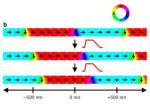(Press-News.org) INDIANAPOLIS -- The number of older adults with dementia in the United States is forecast to more than double over the next 40 years. Caring for these individuals will have a significant impact on caregivers as well as the health care system and its workforce.
In a paper published in the April issue of the peer-reviewed journal Health Affairs, Regenstrief Institute investigator Christopher M. Callahan, M.D., founding director of the Indiana University Center for Aging Research, reviews two new dementia care models that seek to decrease stress for caregivers, reduce health care costs and improve quality of care for older adults.
Among the most significant features of both of these care models, Dr. Callahan said, are caregivers' close involvement with the medical team and an underlying understanding that decisions should be based on attaining agreed upon goals -- goals that may rule out burdensome treatments for the older adult with dementia.
"To date, the development of a cure for Alzheimer's disease remains elusive. We need to devote more resources to providing humane, high-touch, less costly care today and for many years to come for the large number of individuals who are and will be affected," said Dr. Callahan, the Cornelius and Yvonne Pettinga Professor in Aging Research at the IU School of Medicine. "It's time to think about going back to the basics to improve the quality of life for both the patient and the caregivers."
Dr. Callahan is a geriatrician whose own research has focused on depression in older adults and on the care of older adults by primary care physicians. He and co-authors reviewed two care models that offer promise for implementation on a national scale: Optimizing Patient Transfers, Impacting Medical Quality and Improving Symptoms: Transforming Institutional Care, known as OPTIMISTIC; and the Healthy Aging Brain Center. Both care models were developed by Regenstrief and IU clinician-researchers with support from the Center for Medicare and Medicaid Innovation and in collaboration with Eskenazi Health.
Features of both care models profiled in the review article -- such as a team-based approach to care; a focus on the caregiver, who may be a family member or a paid health care worker; and the long-term management of symptoms -- are not easily applied within the current structure of primary care. Thus, these new models require a redesign of the health care system and changes in the workforce. And, significantly, the models run counter to financial incentives in the current health care delivery system.
Each model is being implemented on a broad scale, with the goal of demonstrating improved dementia care quality and outcomes, accompanied by cost savings, in both community-based and institutional care settings.
"The larger question, however, is what the United States is willing to pay for this care -- and researchers, health care systems, payers, and the American public all need to address that question," the paper concluded. "Achieving the goals of better outcomes and lower costs will require leadership from academe, industry, government, and advocacy groups to advance the debate about what is the optimal approach to care for older adults with dementia who are nearing the end of life."
INFORMATION:
Authors of "Redesigning Systems of Care for Older Adults With Alzheimer's Disease," in addition to Dr. Callahan, are Greg A. Sachs, M.D.; Michael A. LaMantia, M.D., MPH; Kathleen T. Unroe, M.D., MHA; Greg Arling, Ph.D.; and Malaz A. Boustani, M.D., MPH. All are Regenstrief Institute investigators, IU Center for Aging Research scientists and faculty members of the IU School of Medicine.
The work was supported the Department of Health and Human Services' National Institute on Aging (grants R01 AG034946 and AG024078) of the National Institutes of Health, and Centers for Medicare and Medicaid Services CMS Innovation Grants: 1E1CMS331082-01-00 and 1C1CMS331000-01-00. Contents of the paper are solely the responsibility of the authors and have not been approved by the Department of Health and Human Services.
Back to basics: Redesigning systems of care for older adults with Alzheimer's disease
Two new dementia care models seek to decrease stress for caregivers, reduce health care costs and improve quality of care for older adults
2014-04-08
ELSE PRESS RELEASES FROM THIS DATE:
Kitchens are a source of multi-drug resistant bacteria
2014-04-08
CHICAGO (April 8, 2014) – After handling raw poultry, hands of food preparers and cutting boards remain a source of transmission for multi-drug resistant bacteria, such as E. coli that produce extended-spectrum beta-lactamases (ESBLs). The study of household and hospital kitchens was published in the May issue of Infection Control and Hospital Epidemiology, the journal of the Society for Healthcare Epidemiology of America.
"The spread of multi-drug resistant bacteria has been associated with the hospital setting, but these findings suggest that transmission of drug-resistant ...
Expert guidance highlights practices to reduce prevalence of catheter-associated UTIs
2014-04-08
CHICAGO (April 8, 2014) – New expert guidance highlights strategies for implementing and prioritizing efforts to prevent catheter-associated urinary tract infections (CAUTI) in hospitals. The practice recommendations, published in the May issue of Infection Control and Hospital Epidemiology, are the first in a series to be published over several months sharing evidence-based strategies to help healthcare professionals effectively control and prevent the spread of healthcare-associated infections (HAIs).
A Compendium of Strategies to Prevent Healthcare-Associated Infections ...
Domain walls in nanowires cleverly set in motion
2014-04-08
Researchers at Johannes Gutenberg University Mainz (JGU) have achieved a major breakthrough in the development of methods of information processing in nanomagnets. Using a new trick, they have been able to induce synchronous motion of the domain walls in a ferromagnetic nanowire. This involved applying a pulsed magnetic field that was perpendicular to the plane of the domain walls. "This is a radically new solution," explained Professor Mathias Kläui of the Institute of Physics of Johannes Gutenberg University Mainz. "It enables us to move domain walls synchronously over ...
Montreal researchers explain how our immune system kills abnormal blood cells
2014-04-08
A team of researchers at the IRCM, led by André Veillette, MD, explains how our immune system kills abnormal blood cells. Their discovery, recently published in the Journal of Experimental Medicine, could eventually lead to new treatment avenues for leukemia, lymphoma and certain types of infectious viral diseases.
"Our team is studying how natural killer cells can eliminate abnormal hematopoietic (blood) cells," explains Dr. Veillette, Director of the Molecular Oncology research unit at the IRCM. "NK (natural killer) cells are crucial to the immune system and play a ...
How coughs and sneezes float farther than you think
2014-04-08
The next time you feel a sneeze coming on, raise your elbow to cover up that multiphase turbulent buoyant cloud you're about to expel.
That's right: A novel study by MIT researchers shows that coughs and sneezes have associated gas clouds that keep their potentially infectious droplets aloft over much greater distances than previously realized.
"When you cough or sneeze, you see the droplets, or feel them if someone sneezes on you," says John Bush, a professor of applied mathematics at MIT, and co-author of a new paper on the subject. "But you don't see the cloud, ...
Gothenburg scientist in Nature: Climate models underestimate costs to future generations
2014-04-08
The seven scientists behind the article, due to be published 10 April, conclude that the reports by the UN climate panel serve an important function in setting the agenda for climate research. Yet the most important role of the Intergovernmental Panel on Climate Change (IPCC) is to inform the global political discussion on how the harm caused by climate change should be handled.
Thomas Sterner, expert on policy instruments to reduce greenhouse gas emissions, is a Coordinating Lead Author of one key chapter on policy instruments in the Working Group III of the Fifth Assessment ...
Are women in Iran who use Facebook less likely to wear a veil?
2014-04-08
New Rochelle, NY, April 8, 2014—Use of social media such as Facebook can influence attitudes and behaviors among people of all countries and cultures. Among women in Iran, the duration and amount of daily Facebook activity is associated with their desire to wear a traditional head-covering and their willingness to display pictures of themselves without a veil, according to an article in Cyberpsychology, Behavior, and Social Networking, a peer-reviewed journal from Mary Ann Liebert, Inc., publishers. The article is available free on the Cyberpsychology, Behavior, and Social ...
New research may provide effective nonsurgical treatment for knee osteoarthritis
2014-04-08
New Rochelle, NY, April 8, 2014—A new nonsurgical approach to treating chronic pain and stiffness associated with knee osteoarthritis has demonstrated significant, lasting improvement in knee pain, function, and stiffness. This safe, two-solution treatment delivered in a series of injections into and around the knee joint is called prolotherapy, and is described in The Journal of Alternative and Complementary Medicine, a peer-reviewed journal from Mary Ann Liebert, Inc., publishers. The article is available free on The Journal of Alternative and Complementary Medicine website.
David ...
Breast cancer cell subpopulation cooperation can spur tumor growth
2014-04-08
Subpopulations of breast cancer cells sometimes cooperate to aid tumor growth, according to Penn State College of Medicine researchers, who believe that understanding the relationship between cancer subpopulations could lead to new targets for cancer treatment.
Cancers contain genetically different subpopulations of cells, called subclones. Researchers have long known that these mutant subclones aggressively compete with one another to become the dominant tumor cell population. However, in some cases it seems that no single subclone can achieve dominance on its own. ...
Tracking sugar movement in plants
2014-04-08
A new study published in the Proceedings of the National Academy of Sciences by scientists at the University of Queensland, Australia, overturns a long-held theory in plant science [see:http://www.bnl.gov/newsroom/news.php?a=11631]. Researchers at the U.S. Department of Energy's (DOE) Brookhaven National Laboratory who are co-authors on this paper conducted critical radiotracer studies that support the new theory that plant sugars play a dominant role in regulating branching at plant stems. While branching has relevance in agriculture, it is also very important in bioenergy ...
LAST 30 PRESS RELEASES:
Novel camel antimicrobial peptides show promise against drug-resistant bacteria
Scientists discover why we know when to stop scratching an itch
A hidden reason inner ear cells die – and what it means for preventing hearing loss
Researchers discover how tuberculosis bacteria use a “stealth” mechanism to evade the immune system
New microscopy technique lets scientists see cells in unprecedented detail and color
Sometimes less is more: Scientists rethink how to pack medicine into tiny delivery capsules
Scientists build low-cost microscope to study living cells in zero gravity
The Biophysical Journal names Denis V. Titov the 2025 Paper of the Year-Early Career Investigator awardee
Scientists show how your body senses cold—and why menthol feels cool
Scientists deliver new molecule for getting DNA into cells
Study reveals insights about brain regions linked to OCD, informing potential treatments
Does ocean saltiness influence El Niño?
2026 Young Investigators: ONR celebrates new talent tackling warfighter challenges
Genetics help explain who gets the ‘telltale tingle’ from music, art and literature
Many Americans misunderstand medical aid in dying laws
Researchers publish landmark infectious disease study in ‘Science’
New NSF award supports innovative role-playing game approach to strengthening research security in academia
Kumar named to ACMA Emerging Leaders Program for 2026
AI language models could transform aquatic environmental risk assessment
New isotope tools reveal hidden pathways reshaping the global nitrogen cycle
Study reveals how antibiotic structure controls removal from water using biochar
Why chronic pain lasts longer in women: Immune cells offer clues
Toxic exposure creates epigenetic disease risk over 20 generations
More time spent on social media linked to steroid use intentions among boys and men
New study suggests a “kick it while it’s down” approach to cancer treatment could improve cure rates
Milken Institute, Ann Theodore Foundation launch new grant to support clinical trial for potential sarcoidosis treatment
New strategies boost effectiveness of CAR-NK therapy against cancer
Study: Adolescent cannabis use linked to doubling risk of psychotic and bipolar disorders
Invisible harms: drug-related deaths spike after hurricanes and tropical storms
Adolescent cannabis use and risk of psychotic, bipolar, depressive, and anxiety disorders
[Press-News.org] Back to basics: Redesigning systems of care for older adults with Alzheimer's diseaseTwo new dementia care models seek to decrease stress for caregivers, reduce health care costs and improve quality of care for older adults





